HP EliteDesk 705 G4 Mini Tiny Key Specs
Since many of our users are going to want to run different OSes on this, we wanted to give some of the key hardware specs. There is a lot on these machines that are customizable, but this at least gives you some sense of what hardware is available. If you want to know if your hardware is compatible with your OS, this list should help do that tie-out.
CPU Support
- AMD Pro A6-8570E
- AMD Pro A6-9500E
- AMD Pro A10-8770E
- AMD Pro A10-9700E
- AMD Pro A12-8870E
- AMD Athlon Pro 200GE
- AMD Ryzen Pro 3 2200GE
- AMD Ryzen Pro 5 2400GE
RAM Support
- Up to 32GB in 2x DDR4-2933 SODIMMs
Storage Support
- 1x M.2 NVMe SSD
- 1x 2.5″ Drive (SATA)
Networking (Wired)
- Realtek RTL8111
WiFi
- 802.11ac wireless, M.2 Card, Realtek (dual band),
Wi-Fi + Bluetooth 4.2 combo adapter, 1×1 - 802.11ac wireless, M.2 Card, Intel 9260 (dual band),
Wi-Fi + Bluetooth 5 combo adapter, 2×2 - 802.11ac wireless, M.2 Card, Intel 8260 (dual band),
Wi-Fi + Bluetooth 4 combo adapter, 2×2
Chipset
- AMD B300
USB Ports
- 2x USB 3.1 Gen1 Front
- 1x USB 3.1 Gen2 Type-C Front
- 4x USB 3.1 Gen1 Rear
OSes From Factory
- Windows 10 Pro 64
- Windows 10 Home
- FreeDOS
Something that we wanted to quickly point out here is that these CPUs are Ryzen 2xxx series CPUs. For most of the Ryzen 2000 series, we saw a transition to the 12nm Zen+ architecture. These are still 14nm Zen parts. If you are doing comparison shopping, this is something worth keeping in mind.
HP EliteDesk 705 G4 Mini Performance and Power Consumption
Instead of going through the entire Linux-Bench test suite, we are going to show a few performance and power numbers here to give a general sense of performance. We actually planned to do storage testing, but then we realized that there was a huge variability in terms of what drives could be found in machines.
Python Linux 4.4.2 Kernel Compile Benchmark
This is one of the most requested benchmarks for STH over the past few years. The task was simple, we have a standard configuration file, the Linux 4.4.2 kernel from kernel.org, and make the standard auto-generated configuration utilizing every thread in the system. We are expressing results in terms of compiles per hour to make the results easier to read:
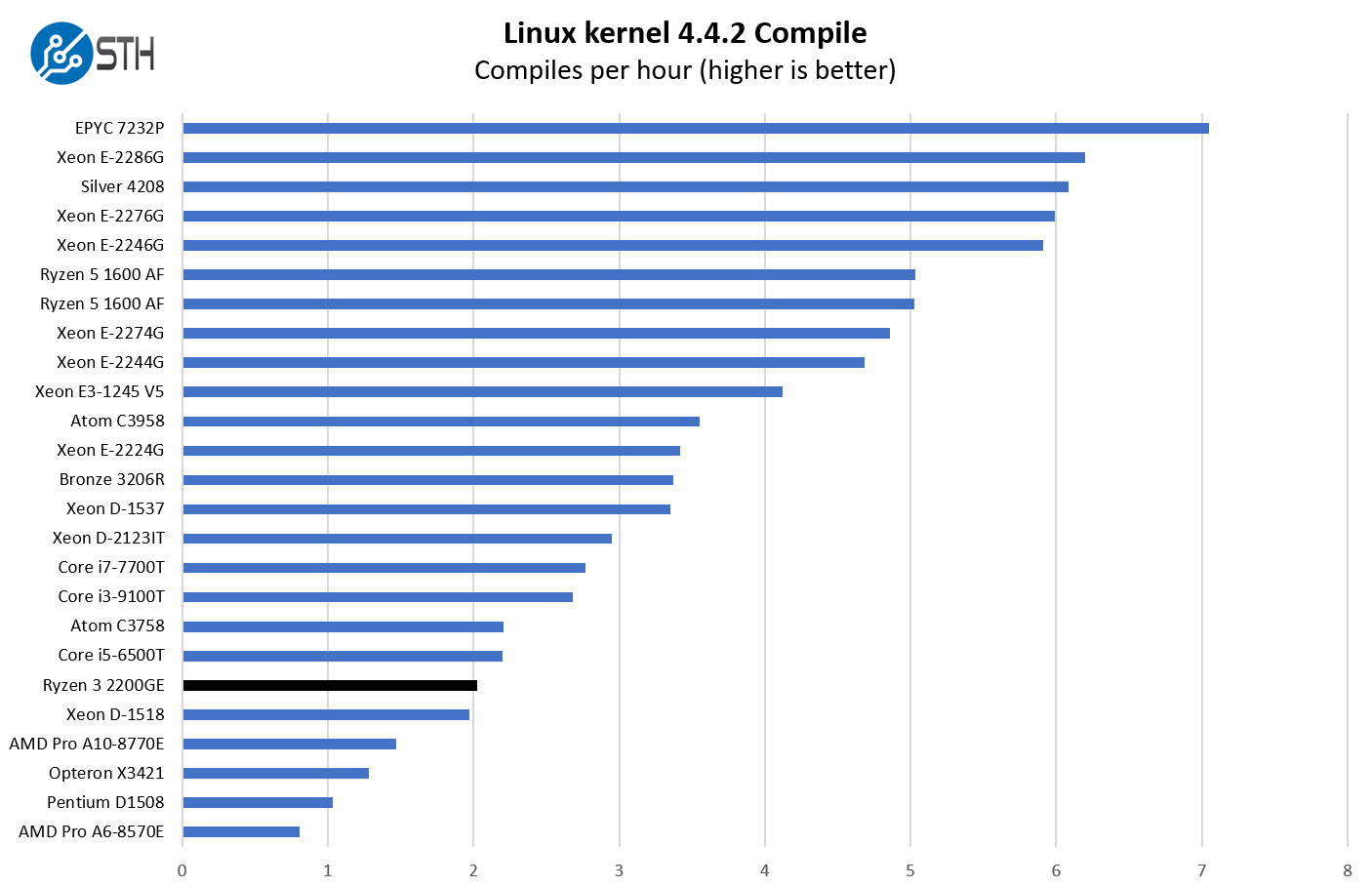
We first wanted to point out that the AMD Ryzen Pro 2200GE generally is 1.5-2x faster than the older HP EliteDesk 705 G3 Mini AMD Pro A10 and A6 options we tested previously. When we looked up the 705 G4 Mini specs we saw these older-generation AMD Pro CPUs as options as well. We should simply note here that the Ryzen CPUs are much better in terms of performance so we are going to suggest those to our readers in this form factor.
7-zip Compression Performance
7-zip is a widely used compression/ decompression program that works cross-platform. We started using the program during our early days with Windows testing. It is now part of Linux-Bench.
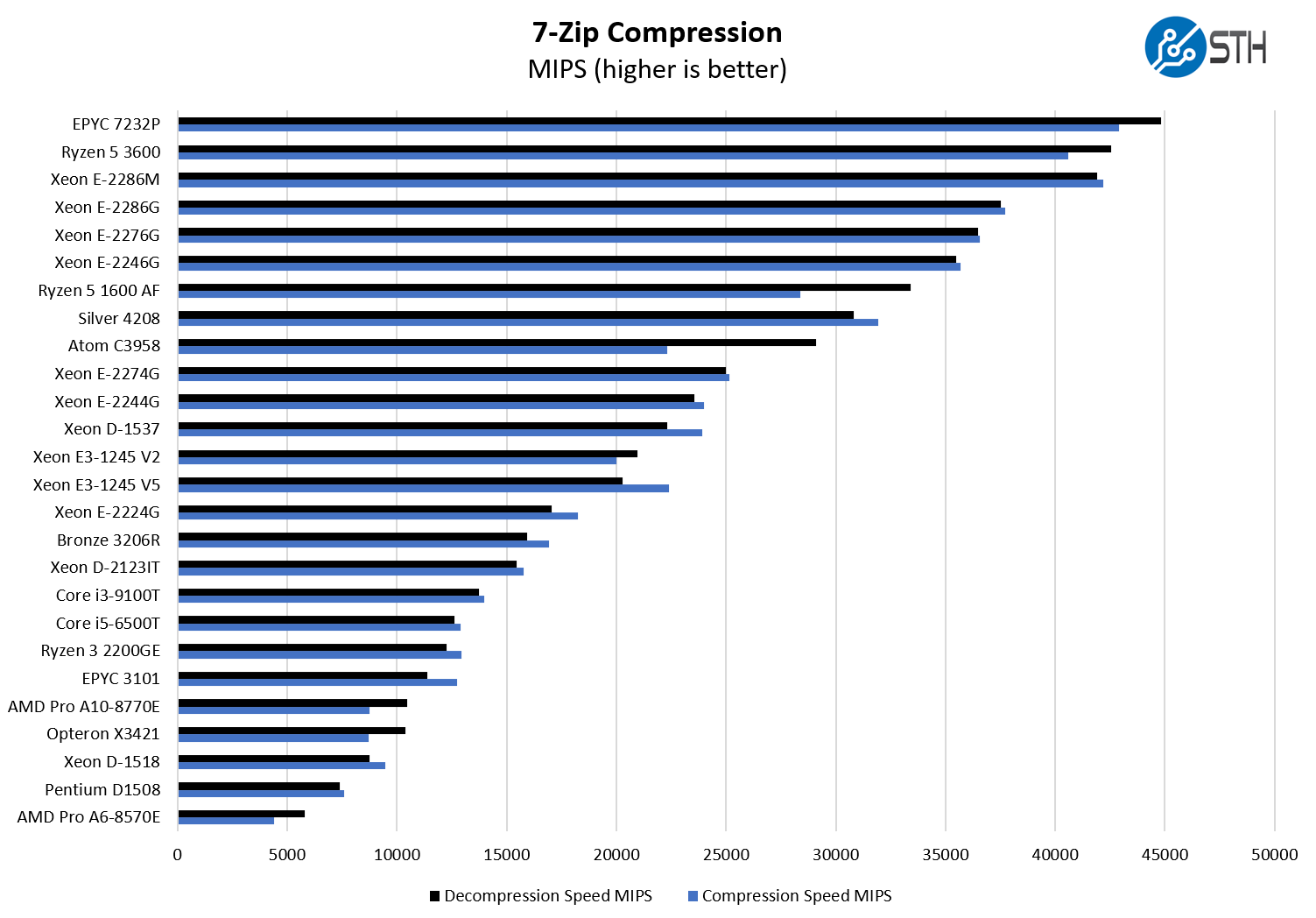
While the AMD Ryzen 3 is good here, we have to remember that this competed with the Core i5-6500T of its day, but is now more aligned to the Core i3 CPUs in subsequent generations. As an example, the Core i3-9100T is much faster.
OpenSSL Performance
OpenSSL is widely used to secure communications between servers. This is an important protocol in many server stacks. We first look at our sign tests:
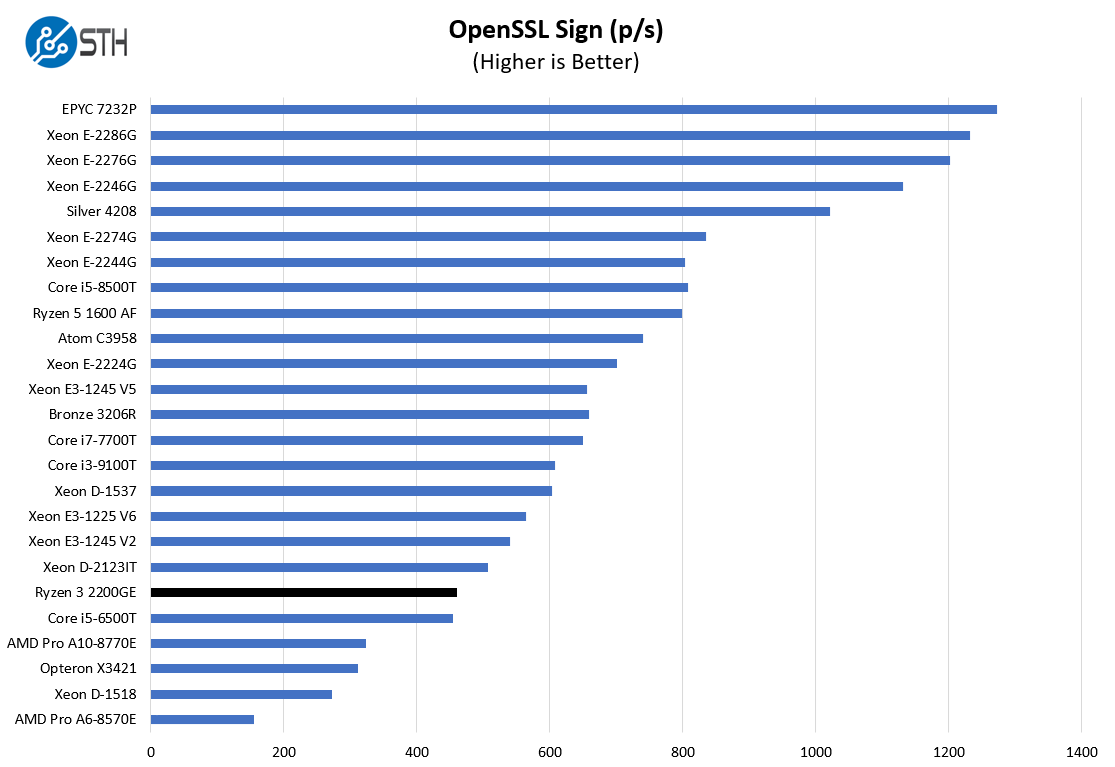
Here are the verify results:
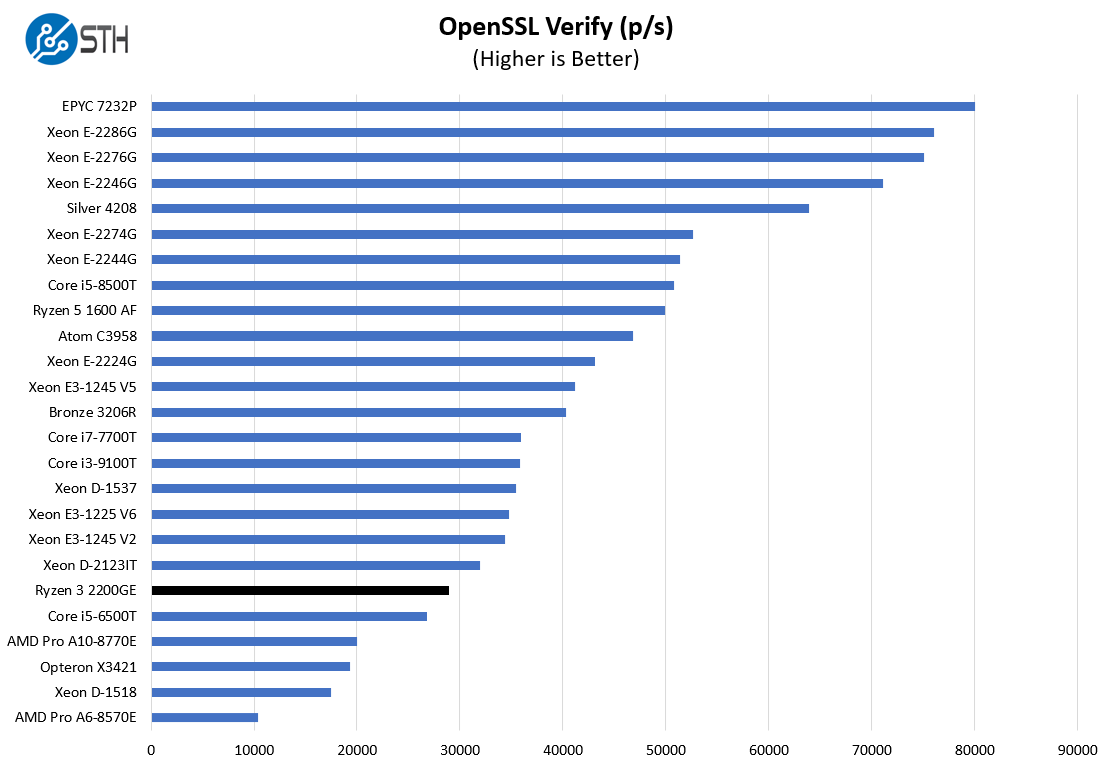
Price wise, these are now selling for more than many of the systems we purchased with Core i5-8500T CPUs. Those Core i5’s were the result of competition from AMD Ryzen like this system. The impact is that those Core i5’s offer six cores instead of four so they generally offer significantly more performance as you can see here. They are also often less expensive on the retail market.
AMD Ryzen Pro 3 2200GE in the HP EliteDesk 705 G4 Mini v. Lenovo M715q
Something we wanted to touch on here was the performance delta between these two machines. They use the same processor, so we double-checked our test output. The two systems ran within +/- 1.5% so we are calling this a virtual tie between the two. OEMs have different levers they can use so we were not guaranteed that result.
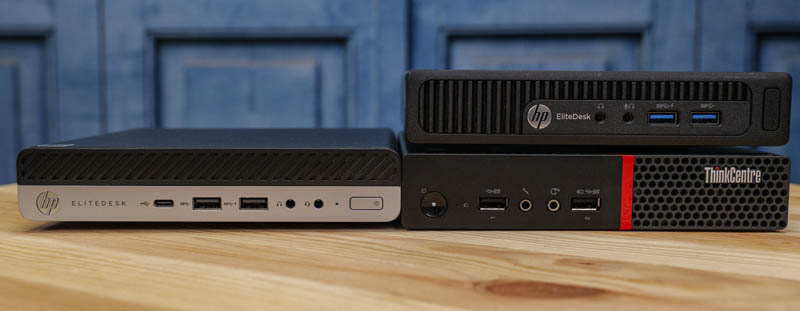
Our key takeaway here is that it is probably better to buy based on the processor model and features rather than hoping that a CPU performs better in one system versus another.
Next, we are going to look at power consumption before moving onto our key lesson learned and final words.

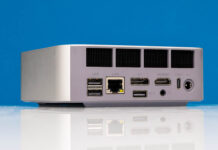
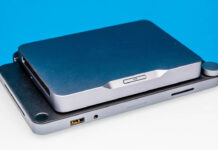
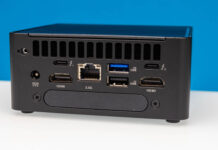
When reflecting on the wisdom “the first lesson learned is to double-check that the units have the features that you want” what I understood is that these machines are difficult to upgrade in the field because they use custom parts. For example a used $30 hd bracket and cable send 10 times more dear than the interchangeable brackets and cables used in many desktop computers.
These tradeoffs in size, price, performance and maintainability are interesting. I wonder if it will take government regulation to ensure compatibility across brands to avoid excess landfill as required for the plugs on the chargers in the mobile phone industry. Can the power brick of the Lenovo supply this HP mini micro?
One system I suggest you check for this series is the Hardkernel ODROID-H2+. It’s a single board computer but I think it qualifies as a TinyMiniMicro. I just bought one as a desktop replacement because the 8GB Raspberry Pie required too many compromises.
Eric – the brackets do need to be somewhat customized for the chassis, so I can see why.
Jon – The ODROID-H2+ is a fairly different segment than these. It is a lower power/ performance and was not an ex-corporate desktop PC. With that said, I do love the dual 2.5GbE on those.
There’s what seems to be a small mistake – under the heading “HP EliteDesk 705 G4 Mini Hardware Overview”, the first line is “The chassis itself is a fairly standard design for the earlier Lenovo Tinys.” – surely this is meant to be “standard design for the earlier HP tinys”?
FYI: I had the Ryzen Pro 5 model. It could not handle my 4K at 60 Hz monitor. YouTube would stutter with 4K videos. Even 1080p was not smooth. Took a bit of time to convince the store to take it back.
My office has 2 of these with the Ryzen 5 2400G in them and either 16GB or 32GB RAM. THey are very nice for office desktops as you can use the VESA mount and put them behind your monitor. We have liked them so far and when it comes time for desktops to be replaced, we will probably be going with these for all our employees.
anyone who tried to fit a non PRO Ryzen on to these?
This 35w version can be upgraded with a 65w Ryzen pro 2400G or the motherboard need to be changed also? In the manual just say that the 2400G is compatible but not specify if it need a 90w o 150w power adapter or a new motherboard with a better cooling system.
Luis – Usually the 65W has at least different power supplies, fans, and cooling. So there is enough to swap that it is not usually worth the effort.
I went to update the bios HP EliteDesk 705 G4 Mini AMD Ryzen, it stuck on the screen with the message “HP SURE START RECOVERY” I can no longer update the bios or enter the bios settings, can anyone help me, thanks in advance.
The review could have mentioned the option for discrete graphics via MXM connector. I know it is not a thing for servers, but HP list that as mandatory for Ryzen CPUs here:
https://support.hp.com/us-en/document/c06101574#AbT2
Which doesn’t seems to be true as the review unit didn’t have the DGPU and just worked fine.
My own unit doesn’t work with 2200G though, but that might be because it should be 2200GE as previous CPU was A10-9700E.
I may have a dud, but mine is not booting with A10 9700e and it previously has a 2400GE.
I’m not sure on parts availability of drive sleds, or the wisdom of running a 2.5″ SATA (2 years on 1TB NVMe are now about $40)
does anyone know where to find the custom sata cable that goes into this mother board to install a 2.5 ssd?
If you plan to get these since they are really cheap and plan to use the 2.5 inch sata disk, I recommend looking at another PC. I have three of these and with M.2 they were working fine. I upgraded to a 4TB M.2 disk and 8TB sata disk. SATA fails at around 100 hours of being powered on with all 3 nodes.
I have swapped SATA cables with extras I bought, swapped disks with motherboards, upgraded BIOS, disabled BIOS power management, made sure disks firmware are updated, and it is still getting this issue. If it was only on one node I’d suspect a bad SSD or node, but it looks like to me the controller has some issues.